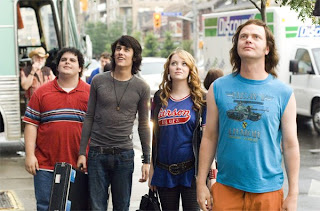From Nun to Nana, my review of the 2nd Season of American Horror Story
With both of my jobs, as both a police dispatcher and an
author, I live a life somewhat outside the realm of regular people, especially
since I work from two in the afternoon until ten at night. My exposure to the ‘daywalker’
world is fairly limited. That’s more by choice than chance, since I seem to
think better in the dark—the wee small hours of the morning make for better copy—but
the whole ‘normal folks/normal schedule’ thing passes me by in terms of relatability.
The thing that really connects me to the rest of the world,
and my guilty pleasure—aside from the writing, of course—is my DVR and the
collection of shows I’ve recorded during the day. I’m a dedicated soap fan from
the womb, so my inclination is less about flash and reality, and more character
and story driven. Right now my not-so-closeted addictions are Justified and
American Horror Story. Since last night was the AHS finale for season two, I
feel moved to discuss it, because I’m still conflicted.
As someone who tells stories for a living, I tend to
approach the actual act of storytelling in a linear fashion. I usually get an
opening scene in my head, play it out from all angles and characters, until I
get the thread I’m trying to grab and follow it to the end of the strand, so to
speak. I know that not everyone does that, but given how last season of AHS
progressed, I’d hoped for the same kind of thing and was somewhat disappointed.
There was very little in the way of logic or causation and for the majority of
the season, while the vignettes were cool, they really didn’t make a whole lot
of sense to the story overall.
The characters, in terms of their structure and overall
motivations, also didn’t work for me. As a viewer, I don’t necessarily need
every little piece of backstory given to me explicitly, but I do need the characters
to eventually make sense. In the first season, that wasn’t really an issue,
since they all made a fair amount of sense in their own twisted ways. In season
two, that was definitely not the case. In season two, I found myself watching
because, like any true addict, I needed to know how the story ended, even
though the characters and overall plot were disjointed and not as engaging. There
was just enough of a hook to keep me interested, but not to the fervent level
of the previous season.
The one character that I did find intriguing in season two
was Sister Jude, played by the incomparable Jessica Lange who won an Emmy for
her work in season one of AHS. Her journey this season from sadistic,
no-nonsense nun to prisoner of her own machinations, to inpatient mental health
case, to finally a grandmother-type figure to the children of one of her former
patients was as impressive to see as it was difficult to watch. She was a
character to root for, which is really what I want in a show that takes up my
Wednesday night and leaves me so unsettled.
I would explain the ending, but that would require layering
pieces from the whole season that really aren’t the point. It did an okay job
of resolving most of the storylines, though a couple of the pieces were either,
in my opinion, cop outs, but that’s simply another indication of a sub-par
season. As to whether or not it was worth getting that damn song they’d had
playing on repeat in the mental ward stuck so far into my subconscious that I
dreamt about it to distinctly creepy effect remains to be seen, but I am
reasonably certain that if they get their act together for season three, I’ll
be back.

Comments
Post a Comment
We would love to hear from you but hope you are a real person and not a spammer. :)